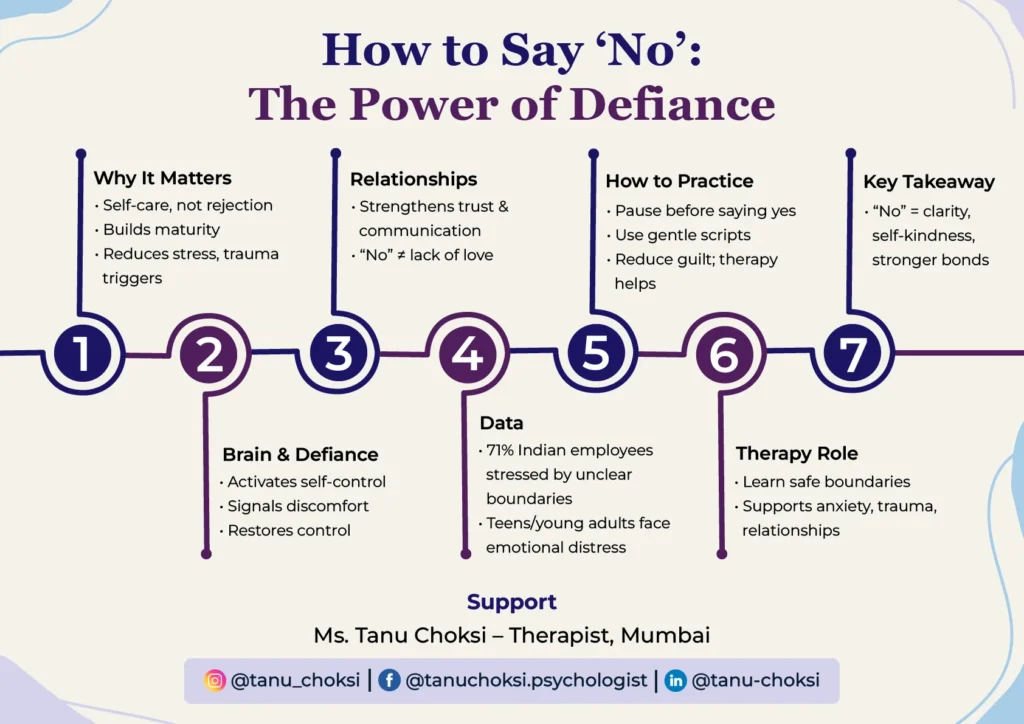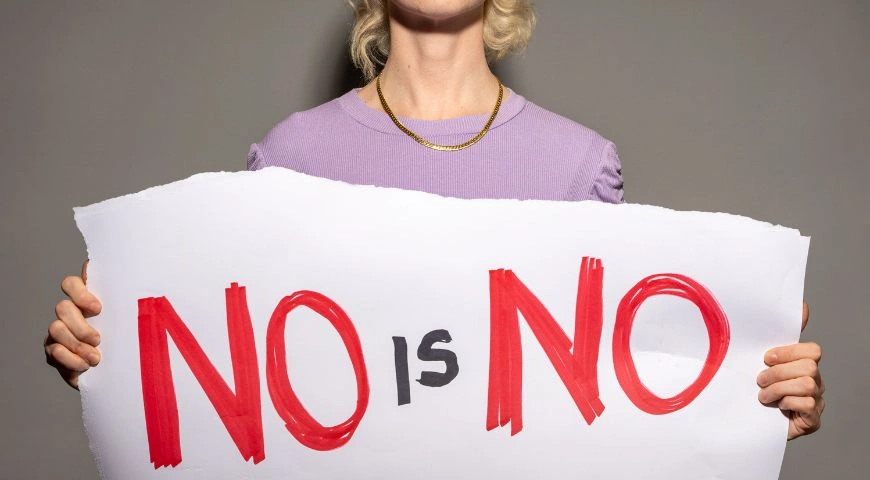In my work as a therapist in Mumbai, I’ve seen how often people find it difficult to say ‘NO.’It is a small word. But for many of us, it can feel incorrect. This is true in places like ours, where we’re taught to meet others with respect, choose peace, and give of ourselves with sincerity. Saying “no” can feel like we’re turning away from the values we were taught, the way we connect with others, or the identity we hold as a helper, friend, or colleague.
But here is what I have understood from my past experiences in individual therapy and family therapy in Mumbai: saying “No” is not to push someone away. It’s an act of self-care and protection.. It is not saying no just to fight. Saying “no” is a way of showing that your needs matter too. In this blog, I will be talking about what I call the “Power of Defiance.” I will show why this skill is key for your mind, your heart, and how you behave with others.

1. Saying No is a Sign of Emotional Maturity
At first, many clients associate saying “no” with immaturity or selfishness, yet it’s far from that. Children often say “no” simply because they feel like it; adults say “no” with intention and care.. When you have a proper understanding of what you can do and what you truly need, you are free to make wise decisions.

That’s why I remind my clients: “No” is a complete and considered decision.. You do not need to give a long list of reasons to be at peace. In my work as a licensed psychologist in India, I have helped people see how saying yes too much can adversely lead to feeling tired, worried, and mad at all times. This is true at work and even in homes, with partners, and with friends, too.This is a significant focus in relationship counselling within the Indian context, where lines that are not clear can lead to long fights. A simple “No” could stop that.
2. The Neuroscience of Defiance: It’s Wired Into Us
Research shows that when we choose to say “no,” it activates parts of the brain that support self-control and protect our well-being. Saying no is not always an act of anger. At times, it’s a sign from your body. Your body is trying to tell you, “I can’t do this anymore,” “This doesn’t feel right,” or “I’m not safe here.”
For those living with PTSD or unresolved wounds, learning to say “no” can be an important step in healing. I have worked with many clients as a PTSD specialist in Mumbai. I see that many find it hard to trust their own “No.” This is because in the past, they might not have been able to say it without fear. If you have had chronic post-traumatic stress disorder symptoms, your body may link saying “No” to harm. But the truth is saying “Yes” when you meant “No” can be just as painful for you over time. When you learn to say “No,” you help your brain get control back. That’s not a fight, it’s making things right again.
3. Saying No Strengthens (Not Destroys) Relationships
One of the most common misconceptions I hear in couple counseling in Mumbai or premarital counseling is this: “If I say No, they’ll think I don’t love them.”
Let’s see it in a new way. If a person’s love for you is based on you always saying yes, is that true love? As an experienced marriage and family therapist in Mumbai, I help people learn about “constructive defiance.” This means you can say you do not agree, make your lines clear, and still feel connected. Saying no, when you do it with care and show you understand, can make trust grow.
It fosters clarity and supports open communication. Replacing silence and hidden resentment as a family therapist in Mumbai, I tell families this: Good homes are not built on just doing what you are told. They are built on all the members being on the same page, even when it means hearing a “no.”
Real-Time Data: How Many of Us Struggle With Boundaries?
A 2024 study in the Indian Journal of Mental Health showed that 71% of people with jobs in India feel a lot of stress from not having clear lines. Women said they felt much more worn out. It applies to those who care for others, manage households, and women employed in major companies.
For teens and young adults aged 15–24, the inability to say “no” was a leading cause of emotional distress in online depression and anxiety tests in India. This shows we must make it normal to understand lines in talks with co-workers, at school, and in our homes.
So, How Do You Build the Power of Defiance?
Here are some real steps I give to my clients in individual therapy, group therapy sessions in Mumbai, and even child counseling work:
Practice Pausing to Build the Power of Defiance: Before you say “Yes,” stop. Ask yourself, “Do I have the time, the go-power, or the want for this?”
Use Gentle Scripts: “No, I’m not free for that right now. “I’d like to help, but I have to say no this time.” You do not have to be mean to be firm.’
Work on Guilt to Build the Power of Defiance: A key part of this work is unlearning the habit of feeling guilty. A helper can back you up like a certified cognitive behavioral therapist in Mumbai who knows all about our ways and how men and women see their roles.
The Role of Therapy in Strengthening Your Boundaries
Boundaries are more than a skill—they are an act of self-care. In my work as a psychologist in India, I’ve seen how they can transform lives. You may have a hard time with anxiety. You may want to please other people or may have trauma. Or you may not be sure about your relationships. Therapy is a safe place for you to learn your “Yes” and “No.” I offer support that is tailored to you, working with people of all ages and this includes premarital counseling services in Mumbai, anxiety management programs in Mumbai, and online psychologist consultation in India. If you’ve wondered whether your boundaries harm or help your relationships, you’re not alone, and it’s never too late to make a change.
Conclusion: Your No Is Sacred
Saying “no” doesn’t make you unkind; it makes you clear. In a world that asks you to work harder and say “yes” to everything, “no” can be one of the kindest things you do for yourself. As a therapist in Mumbai, I see it every day: clients arrive feeling guilty about their boundaries and leave feeling stronger because of them. That is the power of therapy. That is the power of saying “no.”
Practo Profile Line:
Ms. Tanu Choksi is a warm and friendly counselor and therapist in Mumbai, offering patient, non-judgmental, and rational solutions to personal problems.
Follow me for more insights on Instagram, Facebook, and LinkedIn.




